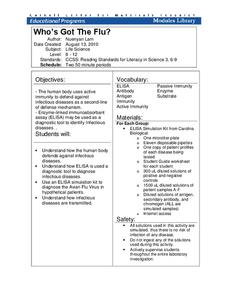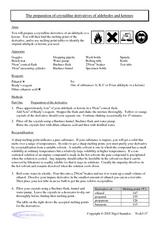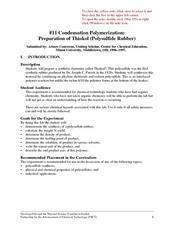University of Minnesota
Get the Point(s)
Do all areas of your skin have the same sensitivity to touch? Playing with the sense of touch, this experiment has scholars guessing how many pin heads gently touch their arm and hand. In the second part, pupils answer questions about...
Cornell University
Who’s Got The Flu?
Become an immunologist for the day. Scholars elicit the use of the enzyme-linked immunoabsorbent assay (ELISA) to diagnose an infectious disease. Through the process, they learn about the immune system response to infectious diseases.
Curated OER
Foods II Introductory Review Practical Test
Students have a lab experience preparing a recipe demonstrating the techniques learned from Foods I. They identify and explain the appropriate use and care of basic kitchen equipment. They apply the skills and techniques of proper...
Curated OER
Review for Test on sections 6.2-6.3
Twelfth graders review integration techniques to get ready for their test. For this calculus lesson, 12th graders review integrals, trig substitution, integration by parts, trapezoidal rules and simpson's rule in preparation for a test....
Curated OER
Test on Chapter 8
Twelfth graders review integration techniques to get ready for their test. In this calculus lesson plan, 12th graders review integrals, trig substitution, integration by parts, trapezoidal rules and simpson's rule in preparation for a...
Curated OER
Functions and the Vertical Line Test
Students examine functions and function notation. They use computer activities to discover how to graph functions, and conduct a vertical line test. Students describe spatial relationships using coordinate geometry.
Curated OER
Preparation of Triiodomethane (iodoform)
In this preparation of triiodomethane worksheet, learners use propanone to prepare triiodomethane. Students use filtration and recrystallization in order to make the product. They determine the melting point using a melting point apparatus.
Curated OER
Sensitive Taste Test
Fifth graders investigate concentrated and diluted solutions by conducting a taste test. In this dilution lesson plan, 5th graders examine the concentration of different juices samples by tasting them and recording their observations....
Curated OER
Wet or Dry Experiment
Practice the scientific process by testing whether mealworms prefer a wet or dry environment. This is an engaging experiment to use as an example of how to go through the steps of the scientific method. Elementary schoolers can work in...
Curated OER
Environmental Concerns (1) Analysis of Lead in Paint (2) Analysis of Water
A scenario and background information are provided for two different open-ended experiments that experienced chemistry classes can perform toward the end of the school year. In the first, they design a method for testing flakes of paint...
Curated OER
Economics Quiz
Let your scholars test their economics skills with this 55-question quiz! They respond to fill-in-the-blank and multiple-choice questions pertaining to the study of microeconomics and macroeconomics. All answers are provided, and the...
Curated OER
Where's the Beef - Beef Facts or Hype, Is it Bad for You?
Analyze a Happy Meal™ for nutrient content and calories. Blend the contents into "McMush" and use Biuret's solution to test for protein content. There are a few problems with the lesson plan: the resource links are no longer valid, the...
Curated OER
What's Your Style?
Sixth graders complete a learning style assessment and evaluate the information gained to determine accuracy in terms of what they know about themselves as learners. They then identify and implement strategies related to their preferred...
Curated OER
Cool Liquids
Chemistry neophytes use a temperature probe to assess the change as five different liquids evaporate. The implantation section suggests that they take readings every five seconds for a total of four minutes. They graph the data, look up...
Curated OER
Vocabulary 2c - Life Science: From Parents to Young
This life science vocabulary list and definitions will be useful when teaching a parent and offspring unit. Some nice ideas are included in the plan about the word origins, word structure and definition testing methods. There is also a...
Curated OER
Examining The Scores
Students investigate test scores taken to obtain academic strengths and weaknesses. They practice looking at the scores in order to interpret the results. Students use time for class discussion and planning study strategies to target...
Curated OER
What is Dissolved Oxygen?
Students experiment with the LaMotte Winkler-Titration Test Kit to try to answer the question of what is dissolved oxygen. They explore all the possible ways to test for dissolved oxygen and brainstorm all the obstacles that can affect...
Curated OER
Pay to Learn?
Students discuss the concept of schools paying students as an incentive for scoring higher on standardized tests. They debate the key issues of this question and write a letter to the local board of education expressing their position.
American Chemical Society
Preparation and Combustion of Biodiesel
The United States is the world's largest producer of biofuel. During an in-class investigation, young scientists produce their own biodiesel. They burn a sample of it to determine the heat of combustion. Then they discuss the results...
Curated OER
Preparation of Crystalline Derivatives of Aldehydes and Ketones
Chemistry explorers prepare a crystalline derivative and find its melting point. Once they discover the melting point, they are able to identify whether or not the substance is pure, and whether it is an aldehyde or ketone. This is an...
Curated OER
Condensation Polymerization: Preparation of Thiokoll® (Polysulfide Rubber)
This lab activity is geared toward experienced chemistry learners, in particular, those who are familiar with organic chemistry. They will create a synthetic elastomer and then make observations and measurements of its different...
Virginia Department of Education
Properties of Compounds and Chemical Formulas
Young chemists have unknown compounds they need to sort. Performing three different tests on each, the chemical behaviors they observe become the basis for data analysis.
Core Knowledge Foundation
Third Grade Skills Unit 6: Gods, Giants, and Dwarves
The halfway mark of a series offers final skills practice in spelling patterns, suffixes, and building sentences with conjunctions in preparation for assessments that gauge proficiency. Remediation and enrichment follow the test results...
Core Knowledge Foundation
Kindergarten Skills Unit 5
A unit designed for kindergarteners builds letter-sound correspondence in preparation for reading. Over four weeks, young scholars build proficiency in recognizing and matching the sound of 9 letters. They take that knowledge to read a...

























